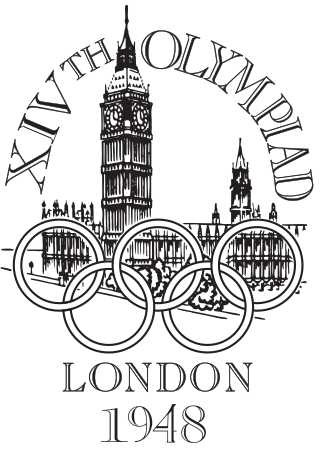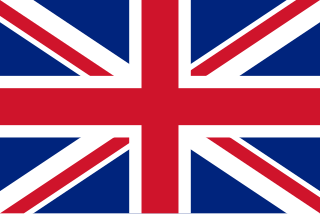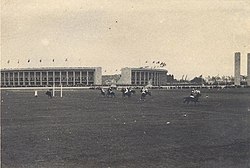
The 1948 Summer Olympics, officially the Games of the XIV Olympiad and officially branded as London 1948, were an international multi-sport event held from 29 July to 14 August 1948 in London, United Kingdom. Following a twelve-year hiatus caused by the outbreak of World War II, these were the first Summer Olympics held since the 1936 Games in Berlin. The 1940 Olympic Games had been scheduled for Tokyo and then for Helsinki, while the 1944 Olympic Games had been provisionally planned for London. This was the second time London hosted the Olympic Games, having previously hosted them in 1908, making it the second city to host summer olympics twice. The Olympics would return again to London 64 years later in 2012, making London the first city to host the games thrice, and the only such city until Paris, who hosted their third games in 2024, and Los Angeles, who will host theirs in 2028. The 1948 Olympic Games were also the first of two summer Games held under the IOC presidency of Sigfrid Edström.

At the 1900 Summer Olympics, a polo tournament was contested. Matches were held on 28 May, 31 May, and 2 June. Five teams competed. Four of these teams were of mixed nationality, with British and French athletes competing on three teams. There was no playoff for third place.

Basketball at the 1936 Summer Olympics was the first appearance of the sport of basketball as an official Olympic medal event. The tournament was played between 7 August and 14 August 1936 in Berlin, Germany. 23 nations entered the competition, making basketball the largest tournament of the team sports, but Hungary and Spain withdrew, meaning 21 competed.

Association football has been included in every Summer Olympic Games as a men's competition sport, except 1896 and 1932. Women's football was added to the official program at the Atlanta 1996 Games.

The field hockey tournament at the 1936 Summer Olympics was the fifth edition of the field hockey event at the Summer Olympics.

France was the host of the 1900 Summer Olympics in Paris. France was one of many nations that had competed in the 1896 Summer Olympics in Greece and had returned to compete at the 1900 Games.

The United Kingdom of Great Britain and Ireland competed as Great Britain at the 1900 Summer Olympics in Paris, France. It was the second appearance of Britain after having participated in the inaugural 1896 Games. In Olympic competition, the nation has always shortened its official name to Great Britain rather than the United Kingdom seen elsewhere.

The United Kingdom has been represented at every modern Olympic Games. By end of the 2024 Summer Olympics, it is third in the all-time Summer Olympic medal table by overall number of medals, and fourth in number of gold medals won. London hosted the Summer Olympic Games in 1908, 1948 and 2012.

The modern Olympic Games were founded by French historian Pierre de Coubertin. France has competed in every edition, with the possible exception of the 1904 Games.

Peru has officially participated in 20 Summer Olympic Games and 3 Winter Olympic Games. They did not send any athletes to the 1952 Summer Olympics. The Peruvian Olympic Committee is the National Olympic Committee for Peru which was founded in 1924 and recognized by the International Olympic Committee in 1936.

Water polo has been part of the Summer Olympics program since the second games, in 1900. A women's water polo tournament was introduced for the 2000 Summer Olympics. Hungary has been the most successful country in men's tournament, while the United States is the only team to win multiple times at the women's tournament since its introduction. Italy was the first to win both the men's and women's water polo tournaments.

Great Britain, represented by the British Olympic Association (BOA), competed at the 1920 Summer Olympics in Antwerp, Belgium. 234 competitors, 218 men and 16 women, took part in 84 events in 21 sports. British athletes won fourteen gold medals and 43 medals overall, finishing third. It would be the last Olympic Games in which Irish athletes participated for Great Britain, after foundation of Irish Free State in 1922.

Great Britain, represented by the British Olympic Association (BOA), competed at the 1924 Summer Olympics in Paris, France. This was the first Summer Olympics in which athletes from the newly independent Irish Free State competed separately. Following the Royal and Parliamentary Titles Act 1927, the name changed (officially) to 'United Kingdom of Great Britain and Northern Ireland' but the Olympic team competed as Great Britain from the 1928 games onwards. 267 competitors, 239 men and 28 women, took part in 115 events in 18 sports.

Spain competed at the 1920 Summer Olympics in Antwerp, Belgium. It was only the second appearance of the nation at the Summer Games, after competing in the 1900 Summer Olympics, but missing the Games in 1904, 1908, and 1912. 58 competitors, all men, took part in 29 events in 7 sports.

The 1928 Summer Olympics Water Polo event was held between the fourth and eleventh of August. The final results of the tournament follow below.

A polo tournament was contested at the 1924 Summer Olympics in Paris. The competition ran from 28 June to 12 July at the Château de Bagatelle and the Saint-Cloud Racecourse, with five teams competing. Argentina won the gold medal, beating all four of the other nations in the country's Olympic polo debut. Silver went to the United States, which played in—and won—the first three games of the tournament before a close-played (6–5) loss to Argentina in game 6. Great Britain, the two-time defending champions, finished with bronze.

Peru Olympic football team represents Peru in international football competitions in multi-sport events such as the Olympic Games and the Pan American Games. The selection is limited to players under the age of 23, except three overage players. The team is controlled by the Peruvian Football Federation (FPF). Peru has participated in two Olympic football tournaments, one Pan American football tournament, and 7 Bolivarian football tournaments under this category.
This article presents the national team appearances in the men's Olympic water polo tournament since the inaugural official edition in 1900.















